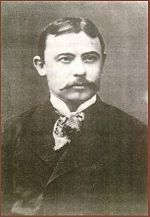
This is a new, English translation of Kálmán Mikszáth’s classic Hungarian novel of The Siege of Beszterce. The hero of the story is a 19th century Hungarian nobleman, Count István Pongrácz, who admires the lifestyle of medieval lords and chooses to lead his life in the same way. He transforms his tenants into soldiers to hold regular military exercises, he follows the lifestyle and daily routine of his ancestors as recorded in the family chronicles. His eccentricity earns him a reputation of being insane. He makes some effort to fit into society: he attends balls and dinners held by neighbouring noble families, and he himself holds dinner parties. Ladies however refuse to attend as he has no lady in the house. To counter this criticism he buys a female acrobat from a travelling circus, to fulfil the role of the lady of the house. She later runs away with a young man to the town of Beszterce, and as the town ridicules his demands to release the lady, he decides to lead his army to lay siege to the town. His journey passes through the town of Zsolna where some of his friends and relatives live. They fear that he would be committed to an asylum for this and put on a performance to replace the lady with another young girl as hostage, until they can find her. The young girl, Apolka, is an orphan, who has just been thrown out of her uncles’ houses. After her father’s death, one of her relatives took her in, and she was badly treated. Her two wealthy uncles’ were bitter rivals, and she became the subject of their rivalry, spending 6 months in each house at a time, each uncle outbidding the other to provide her with a life of luxury. It all stops when her cousin, the son of one of her uncle’s, falls in love with her and wants to marry her. She ends up back with her poor relative, and this time she is treated better than before. When he makes an attempt to force her to marry him, she runs away. The mayor tries to find a place for her, and this is the day when Count Pongrácz reaches the town on his way to Beszterce. Apolka is taken to the Count’s castle, and he lavishes her in luxuries, determined to hand her back as a ‘polished diamond’. He does not realise that he is slowly falling in love with her, mistaking his feelings for fatherly affections, not having experienced love before. When her cousin seeks her out and demands her release, events take a dramatic turn and the story has a tragic ending. By turns absurd and heartbreaking, this new translation of a Hungarian classic rivals Don Quixote.
Author

Kálmán Mikszáth Kiscsoltó was a major Hungarian novelist, journalist, and politician. Mikszáth was born in Sklabiná into a family of the lesser nobility. He studied Law at the University of Budapest from 1866 to 1869, although he did not apply for any exam, and became involved in journalism, writing for many Hungarian newspapers including the Pesti Hírlap. His early short stories were based on the lives of peasants and artisans, and had little appeal. However, they demonstrated his skill in crafting humorous anecdotes, which would be developed in his later, more popular works. Many of his novels contained social commentary and satire, and towards the end of his life they became increasingly critical of the aristocracy and the burden he believed the latter placed on Hungarian society. Theodore Roosevelt enjoyed his novel, St. Peter’s Umbrella so much that he visited Mikszáth during his European trip in 1910 solely to express his admiration.[1] Mikszáth was a member of the Liberal Party, and in 1887 was elected to the National Assembly of Hungary (one of the two top legislatures in Austria-Hungary). Until 1879 he was the representative for the Illyefalva District in Transylvania, and from 1892 until his death he represented the Fogaras District. He was buried in Kerepesi Cemetery in Budapest, along his sons János (1886-1890) and Albert (1889-1921).